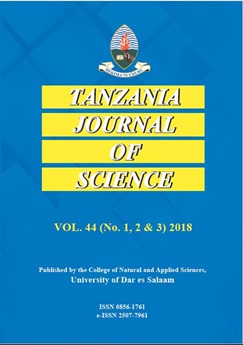Knowledge, Attitudes and Practices on Urinary Schistosomiasis-Related Morbidity among Communities in Itilima District, Tanzania
DOI:
https://doi.org/10.4314/tjs.v48i4.14Abstract
Long-term infections by urinary schistosomiasis can result in urinary tract morbidities and increase the threats to public health. Information on the community ' s knowledge, attitudes, and practices (KAP) on various aspects of urinary schistosomiasis, caused by Schistosoma haematobium has been lacking in Itilima District, which is likely to perpetuate the transmission of the disease and its negative health consequences. This study assessed knowledge, attitudes and practices on schistosomiasis-related morbidities in Itilima District from February to June 2021. A cross-sectional survey using a structured questionnaire was used, and a total of 657 participants were involved in the study. A total of 575 participants (87.5%) had awareness on schistosomiasis compared to 82 (12.5%) who were not aware of the disease, and this variation was statistically significant (x ² = 369.938, DF = 1, p < 0.001). The relationship between urinary schistosomiasis and its related morbidities was known by 111 (16.9%) respondents, while 546 (83.1%) knew nothing about it, and this variation was also statistically significant (c2 = 388.166, DF = 1, p < 0.001). It can be concluded that knowledge of urinary schistosomiasis and its related morbidities among the communities was limited. This is possibly because knowledge of infection stages of S. haematobium that causes the morbidity requires an understanding of disease etiology. Therefore, this study recommends that interventions to impart knowledge on schistosomiasis and the associated morbidities should be implemented in Itilima District.
Keywords: Schistosomiasis, Urinary tract morbidity, Knowledge, Attitudes and Practices, Itilima District


